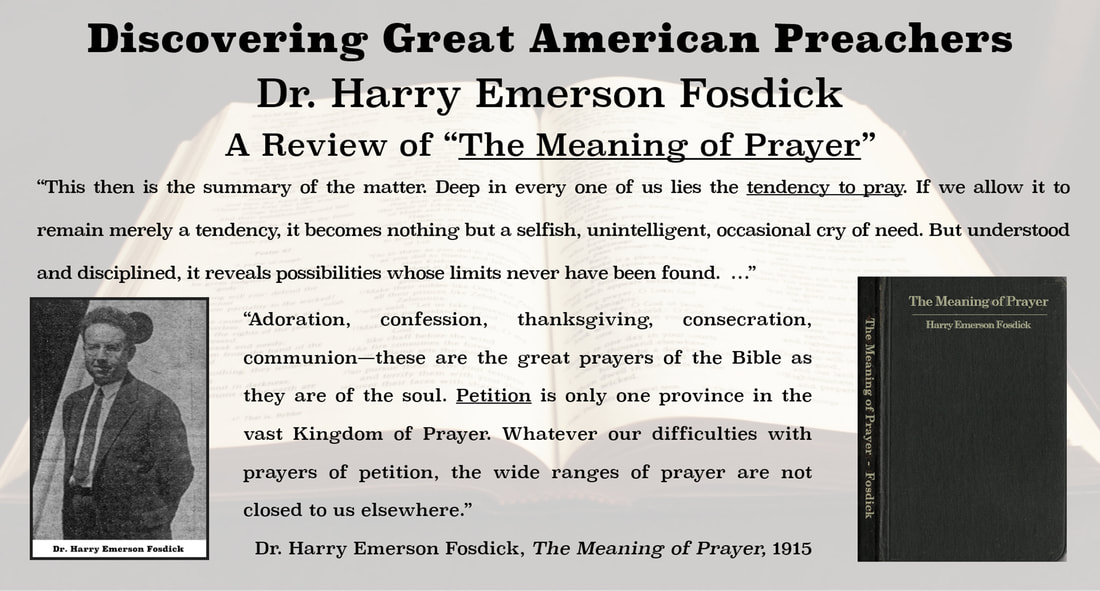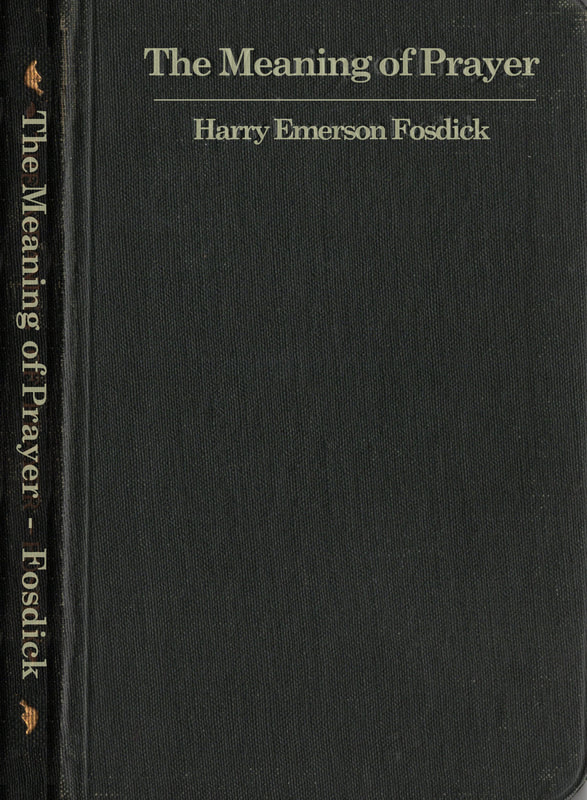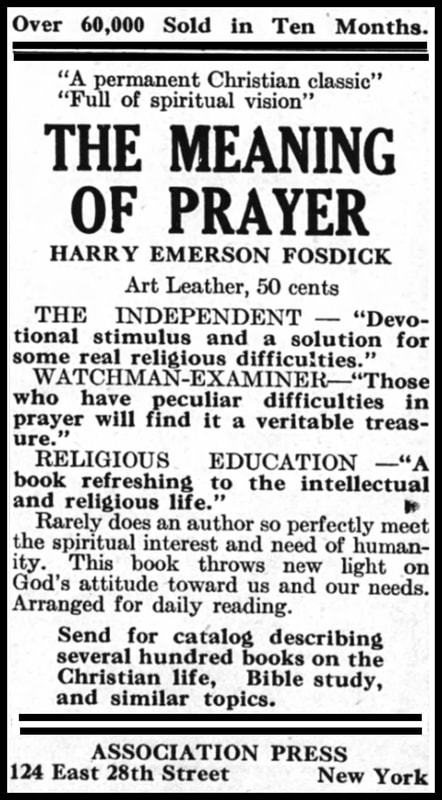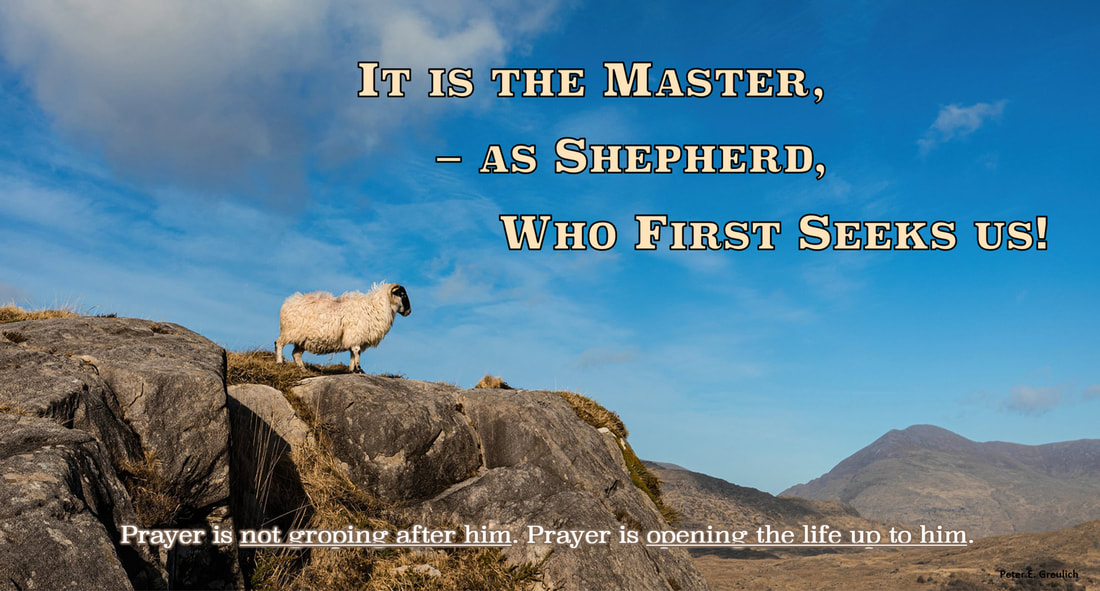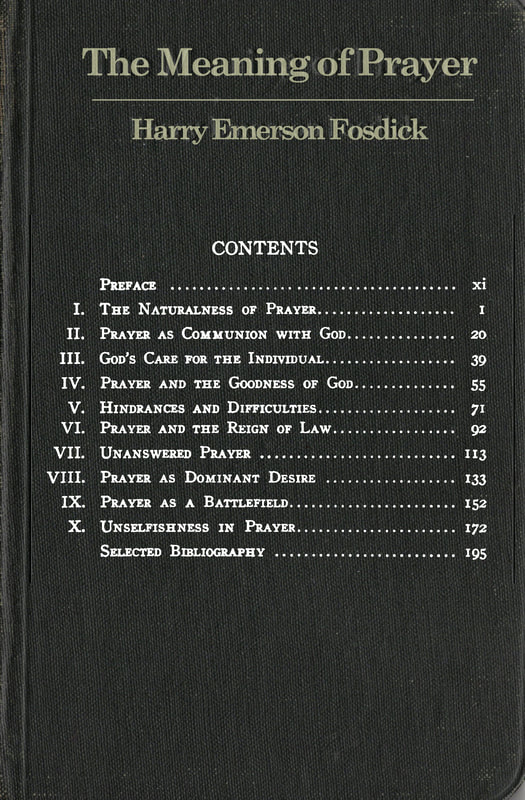A Review of “The Meaning of Prayer” by Reverend Harry Emerson Fosdick
- Positioning Harry Fosdick’s Work, “The Meaning of Prayer”
- Reviews of the Day: 1914–17
- Insights from “The Meaning of Prayer” by Fosdick
- This Author’s Thoughts and Perceptions on Fosdick’s “The Meaning of Prayer”
Positioning Harry Fosdick’s Work, “The Meaning of Prayer”
|
The Meaning of Prayer was not the first book published by Harry Emerson Fosdick. It was apparently at least his fourth work after The Manhood of the Master, The Assurance of Immortality, and The Second Mile. But it was the first book released in the “Meaning of …" trilogy: The Meaning of Prayer, The Meaning of Faith, and the Meaning of Service.
Reverend Pastor S. P. Alison, Presbyterian Church, Maryville, Missouri wrote of this trilogy in 1920 that “These books [from ‘The Meaning of …’ series] are admirable for the daily devotional use for families or individuals.” Dr. Fosdick writes in the Preface to this book that the format followed “met such wide acceptance in my previous book [Manhood of the Master] that it has been continued here.” |
This format has individual chapters—in this case, ten chapters for ten weeks, complete with daily dedicated devotionals. Each chapter or week is subdivided into three sections: “Seven Daily Readings”—one for each day of each week, a weekly “Suggestions for Thought and Discussion,” and a “Comment for the Week.” The “Comment for the Week” is usually a wonderful summary of the week’s chapter. This author found that this “meaning of” series follows a format which yields three wonderful daily, nightstand readers for spiritual study and thoughtful contemplation.
Reviews of the Day: 1914–17
The Meaning of Prayer was a religious work and was not reviewed in the normal places. Only a few references were found that could be positioned as reviews.
|
The image to the right, which is an advertisement for the book published by the Association Press, contains a few insights from two publications. Most of the references in the press were that the book was being used in church studies and group religious meetings around the United States.
That being said, here are two comments—almost reviews, which position the work well: “Professor Harry Emerson Fosdick, D. D., who is to lead the meetings, is one of the ablest and most devoted of the younger ministers of the day. His brief volume on “The Meaning of Prayer” is a masterpiece for its intellectual quality, as well as its spiritual power. “Many churches in this neighborhood have been using this book in their devotional meetings.” New Britain Daily Herald, August 15, 1917
|
“The ‘Meaning of Prayer’ endeavors to answer questions on the subject which are puzzling many minds. … Passages of Scripture are not employed as proof texts to establish an opinion but are used as descriptions of an experience which men have actually had with God.
“In this course of study each chapter is divided into three sections—Daily Readings, Comment for the Week, and Suggestions for Thought and Discussion.
“This arrangement is for daily devotional reading.”
“In this course of study each chapter is divided into three sections—Daily Readings, Comment for the Week, and Suggestions for Thought and Discussion.
“This arrangement is for daily devotional reading.”
“The New Books,” University Missourian, October 28, 1915
Insights from "The Meaning of Prayer"
- Reverend Fosdick Asks Questions [and Proposes Answers] I have Wondered about My Whole Life.
|
“One of the most disconcerting verses in Scripture tells us that God is more willing to give to us than fathers are to give to their children. To some this seems mere sentiment, an exaggerated statement, made in a poetic hour.
"To others, who have cried in vain for things that appeared certainly good, it seems mockery. If God is willing to give, why doesn’t he? What hinders him? How can he be willing to give, when, being omnipotent, he still withholds? Even a superficial observation of human life, however, could supply the answer.
|
“Giving is not a simple matter. It is always a dual transaction in which the recipient is as important a factor as the giver.”
|
“Giving is not a simple matter. It is always a dual transaction in which the recipient is as important a factor as the giver.”
"Prayer and the Goodness of God," The Meaning of Prayer, p. 67
“St. Augustine said, ‘God loves us everyone as though there were but one of us to love.’ That is the message of the Bible, and it underlies the possibility of vital prayer. This truth that God cares for every one of us is easy to speak about, beautiful to contemplate, but it is hard to believe. How can God care for each of us? We know the heart of Jesus well enough to understand that he loved everyone he met. But God?
“How can we make it real to ourselves that He who sustains the Milky Way, Who holds Orion and the Pleiades in His leash, knows us by name?”
“How can we make it real to ourselves that He who sustains the Milky Way, Who holds Orion and the Pleiades in His leash, knows us by name?”
"God’s Care for the Individual," The Meaning of Prayer, p. 47
- Reverend Fosdick Has Insights into Biblical Parables I Had Never Before Considered.
“We have turned the parables of Jesus in the Gospel of Luke quite upside down. According to our attitude in prayer, the shepherd is the one who is lost, and the sheep have gone out on the tempest-driven mountainside to hunt for him. But not so! …
|
“To the Master the sheep are wandering, and the shepherd with undiscourageable persistency is seeking them. Without this thought of God as initiating the search, so that our finding of Him is simply our response to His quest for us, the endeavor of any man to seek God is of all enterprises the most hopeless. …
“The elemental trouble with the prayers of those who fail to find God real is often the very fact that they are seeking for God. No one is prepared to experience the presence of God until he sees that God is seeking for him. … The deepest necessity of a fruitful life of prayer is the recognition that God’s search for men is prior to any man’s search for God. … |
In the parable of the shepherd and his flock, do the sheep go out on the tempest-driven mountainside to hunt for the Savior?
|
“Prayer is not groping after Him. Prayer is opening the life up to Him.”
"Hindrances and Difficulties," The Meaning of Prayer, pp. 88–9
- Reverend Fosdick Is Writing About Society—Even Today
A Need for Men of Genuine Character—Devoted Personalities
“The profoundest need of the world is clean, strong, devoted personality. We are poor there—not in material prosperity or organizing skill or intellectual ingenuity, but in radiant, infectious, convincing personality. The real poverty is poverty of character, and that is due in a large measure to the lack of those spiritual disciplines and fellowships which are included in genuine prayer.
“Let us consider this week [through the devotionals in this book] the service of prayer as an inner battlefield on which the issues of character are settled.”
“Let us consider this week [through the devotionals in this book] the service of prayer as an inner battlefield on which the issues of character are settled.”
"Prayer as a Battlefield," The Meaning of Prayer, pp. 152–53
Some Men Treat God Like Their Country—Sound Like Someone Today?
“In utter selfishness we forget God until it occurs to us that we may get something from Him. Some men treat God in this respect as others treat their country. That regard for native land which in some has inspired heroic and sacrificial deeds, appears in others in the disguise of utter selfishness.
“Consider a man who does nothing whatever for his country; is not interested in her problems; is careless of the franchise, evades every public responsibility, and even dodges taxes. One would suppose that this man never thought of his country at all.
“Upon the contrary, there are occasions when he thinks of her at once. When his person or property is attacked and his rights invaded, this same man will appeal clamorously to the government for protection. He reserves every thought of his country for the hours of personal crisis.
“His relationships are exhausted in spasmodic cries for help.”
“Consider a man who does nothing whatever for his country; is not interested in her problems; is careless of the franchise, evades every public responsibility, and even dodges taxes. One would suppose that this man never thought of his country at all.
“Upon the contrary, there are occasions when he thinks of her at once. When his person or property is attacked and his rights invaded, this same man will appeal clamorously to the government for protection. He reserves every thought of his country for the hours of personal crisis.
“His relationships are exhausted in spasmodic cries for help.”
"The Naturalness of Prayer," The Meaning of Prayer, p. 16
This Author’s Thoughts and Perceptions on Fosdick's "The Meaning of Prayer"
|
This book was released just as World War I was beginning to wreak havoc in Europe. The United States, as democracies commonly are, was caught up in elections that revolved around if the country should or should not intervene. The U.S. would not enter the war until 1917, but the carnage seen taking place there obviously raised the question if prayer was effective.
Before reading this book, I had never thought about how there could be so many “forms” of prayer. Prayer to me came in only one form, what Dr. Harry Emerson Fosdick classifies as a prayer of petition. And, in my case, it was of a form that Fosdick believed was one of the most common reasons we fail to get “answers” to our “prayers of petition.” It was a desire to impose my will on God—by begging, rather than achieving what God wants for me through His will. I surely fit the mold in this respect, and Dr. Fosdick had my immediate attention from the outset. One of the most enlightening concepts from the book was that there are multiple forms of prayer. After reading this, it seemed so natural and obvious that I wondered, “Why hadn’t I thought of this before?” Fosdick classifies prayer in several categories: adoration, confession, thanksgiving, consecration, communion, and petition. |
The front cover of Harry Emerson Fosdick’s “The Meaning of Prayer” overlain with the Table of Contents.
|
“Petition,” he writes, “is only one province in the vast Kingdom of Prayer. Whatever our difficulties there, the wide ranges of prayer are not closed to us. … Nevertheless the province of petition is important … and should never be outgrown. … One obvious reason for our unanswered petitions is, of course, the ignorance of our asking.”
Yep - ignorance is quite simply the lack of knowledge, which I have more of after reading this work! I will leave the rest for you to read. Dr. Harry Emerson Fosdick’s writings—especially in these books on prayer, faith and service—are as applicable today as they were in 1914.
Cheers,
- Pete
Yep - ignorance is quite simply the lack of knowledge, which I have more of after reading this work! I will leave the rest for you to read. Dr. Harry Emerson Fosdick’s writings—especially in these books on prayer, faith and service—are as applicable today as they were in 1914.
Cheers,
- Pete
